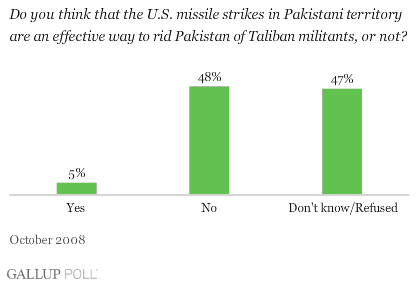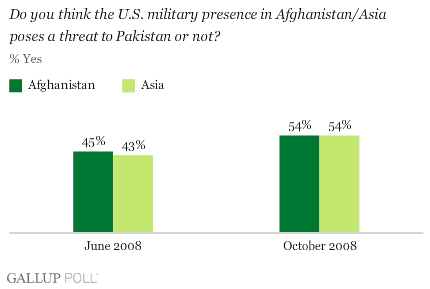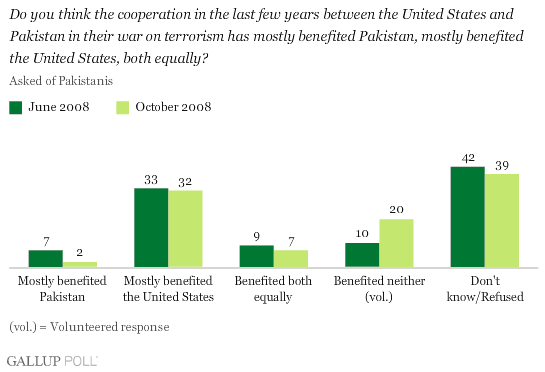Issue at Hand: Militants and terrorist groups operating from safe havens near the Pakistan-Afghan border threaten the United States, allied operations in Afghanistan, and Pakistan's stability. In August 2008, U.S. forces in Afghanistan began to step up cross-border missile attacks on alleged al-Qaeda and Taliban hideouts in western Pakistan. The more than 30 missile strikes this year have claimed insurgent and civilian casualties and angered the United States' longtime ally and its citizens.
Pakistan's new civilian government views the U.S. cross-border attacks as threats to its sovereignty and detrimental to its own efforts to combat terrorism. Pakistan President Asif Ali Zardari has said he expects President-elect Barack Obama to review the need for the strikes when he takes office.
Obama's Stance: During his presidential campaign, Obama stated that if the United States has actionable intelligence about terrorists in Pakistan and Pakistan is unwilling or unable to act, then the United States would. Since his election, Obama has not said whether he will revisit U.S. policy on the strikes, but did say he wishes to create an "effective strategic partnership with Pakistan that allows us in concert to assure that terrorists are not setting up safe-havens in some of these border regions." Obama has said that so far, Zardari is sending the "right signals."
Pakistanis' Views on the Missile Strikes: In October 2008, during which there were several suspected U.S. missile strikes in Pakistan, ���۴�ýasked Pakistanis whether they think U.S. strikes in Pakistani territory are an effective way to rid Pakistan of Taliban militants.
- Nearly half of Pakistanis (48%) did not believe the U.S. missile strikes are effective, while just 5% said they are effective.
- Nearly half of Pakistanis (47%) did not express an opinion as to whether the strikes are effective.

Pakistanis' Views of U.S. Military in Afghanistan, Asia: In June, even before the United States intensified its cross-border attacks, sizable percentages of Pakistanis viewed the U.S. military's presence in Afghanistan and Asia as threats to their country. In October, as strikes continued, majorities of Pakistanis came to embrace this view.
- A majority of Pakistanis (54%) said the U.S. military presence in Afghanistan is a threat to their country, up nine percentage points from the 45% who said so in June.
- A majority of Pakistanis (54%) said the U.S. military presence in Asia is a threat to their country, up 11 points from the 43% who said so in June.

Pakistanis' Views of U.S.-Pakistan Cooperation: Obama has stated that he hopes in coming months to establish a "close, effective, working relationship" with Pakistan that "makes both countries safer." Many Pakistanis would likely see such a mutually beneficial relationship as a change from U.S.-Pakistan relations in the last few years.
- Nearly a third of Pakistanis (32%) said cooperation on the war on terrorism has mostly benefited the United States, largely unchanged from the 33% who said so in June.
- Only 2% of Pakistanis said cooperation has mostly benefited Pakistan, and 7% said it has benefited both countries equally. The percentage of Pakistanis who said cooperation has mostly benefited Pakistan is down slightly from 7% in June.
- Twenty percent of Pakistanis volunteered that cooperation has benefited neither country, which is twice the percentage who said so in June (10%).
- A plurality of Pakistanis (39%) did not express an opinion.

Policy Implications: Experts anticipate that Pakistan will be one of the toughest foreign policy challenges for the new Obama administration. Obama inherits a relationship with a key ally that is fraught with distrust. Many Pakistanis view the U.S. military's presence in the region as a threat to their country and consider U.S. missile strikes an ineffective tactic to rid their country of the Taliban.
What's more, many Pakistanis perceive the benefits of U.S.-Pakistan cooperation in the last few years as largely one-sided, which means success for Obama's plans to create an "effective strategic partnership" will largely hinge on how collaborative and mutually beneficial Pakistanis perceive that partnership to be. And a truly "effective strategic partnership" would also entail more than military interventions that focus on just the war on terrorism in Pakistan and Afghanistan.
Survey Methods
Results are based face-to-face interviews with approximately 840 adults, aged 15 and older, conducted in October 2008 in Pakistan. The survey did not include the Federally Administered Tribal Areas or Azad Jammu and Kashmir. The excluded area represents about 5% of the population. For results based on the total sample of national adults, one can say with 95% confidence that the maximum margin of sampling error is ±5 percentage points. In addition to sampling error, question wording and practical difficulties in conducting surveys can introduce error or bias into the findings of public opinion polls.
